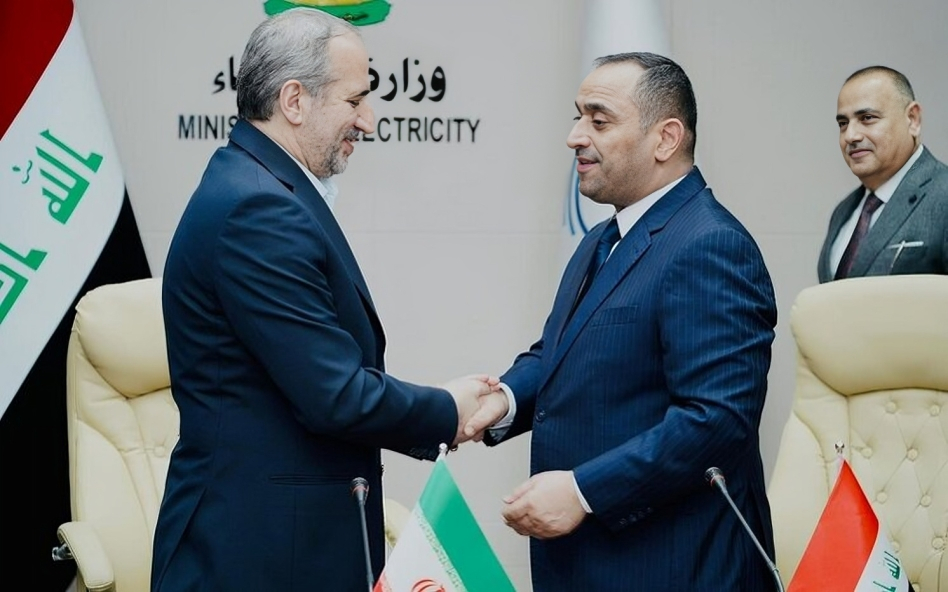Tehran and Baghdad have extended a contract for exporting Iran’s gas to Iraq for five years to meet the needs of power stations. Iran will export about 50 million cubic meters of natural gas per day, according to the needs of Iraqi power stations, in exchange for oil and gasoline.
The new deal envisions twice that amount but only for periods when Iraq needs it. The deal can be described as a temporary measure to help Iraq meet its electricity needs while the country develops its own gas fields.
The contract was signed by the National Iranian Gas Company (NIGC) managing director and the deputy oil minister, Majid Chegeni, and Iraq’s minister of electricity, Ziyad Ali Fazel, in Baghdad on March 27. Iran has earned $15 billion from exporting some 52 billion cubic meters (bcm) of natural gas since 2017, the deputy oil minister said on the sidelines of the signing ceremony.
In turn, the Iraqi minister said that experience over the past years has proved Iran a reliable economic partner for Iraq and added that Iran has met “our needs in the most difficult circumstances.” He added that the deal would “ensure the sustainability of the work of power plants and keep pace with the peak loads and the increasing demand for electric energy.”
Iraq imports much of its natural gas and electricity from Iran to maintain energy supplies amid efforts to reduce its reliance on Iranian imports through cooperation with Western companies. Iraq has billions of dollars in debt to Iran for the import of gas and electricity, and the repayment of the debts in dollars has been a problem in recent years as the US puts pressure on Baghdad to limit its cooperation with Tehran in areas sanctioned by Washington.
In early March, the US renewed a waiver for Iraq to purchase electricity from Iran, which circumvents the sanctions imposed by Washington on Tehran. Iraq heavily relies on Iran for its electricity needs, despite increasing pressure from the US to reduce Baghdad’s dependence on Tehran. With an aging electricity grid unable to match the growing demand, Iraq suffers frequent power outages. However, Iran itself is in dire need of natural gas for its domestic electricity production as well as for keeping its steel, petrochemical, and other heavy industries afloat.
Last year, Iraq imported about nine billion cubic meters of natural gas from Iran, meaning that Tehran supplied about 25 million cubic meters per day. In addition to gas supplies, Iraq also relies on Iran for nearly a third of its electricity. However, cash-strapped Iran switches off its electricity and gas exports to put pressure on Baghdad to urge Washington for waivers. Iran only prioritizes its local consumers when Iraq seems unable to transfer the funds.
The US has issued Iraq a series of sanctions waivers to continue importing Iranian energy but has warned that the waivers could end if Baghdad does not make serious progress toward finding other fuel and power sources. The waivers issued by the US every 120 days are limited to non-sanctioned goods, stressing that Tehran could only use the funds for humanitarian trade and seeking to blunt criticism of giving Iran the money that can be reportedly used to fund terrorism.
However, since last July, the US has started allowing Iraq not only to make payments into restricted Iranian accounts in Iraq but also for the funds to be sent to similarly restricted accounts in third countries. Tehran and Baghdad also agreed to barter oil and gas in July 2023, after Iran cut its gas supply by over 50% due to Iraq’s unpaid debts, which worsened the electricity crisis in the country. In late 2022, the United States tightened measures on Iraq’s access to its foreign reserves held in the Federal Reserve due to suspicions of money being transferred to Iran, Syria, and other sanctioned entities.







 President Ilham Aliyev shed light on the evolving contours of the peace process with Armenia during an international conference in Baku this week. ...
President Ilham Aliyev shed light on the evolving contours of the peace process with Armenia during an international conference in Baku this week. ...
 Azerbaijan and Armenia started the process of demarcation of their border on Tuesday, with the installation of the first border markers based on ge...
Azerbaijan and Armenia started the process of demarcation of their border on Tuesday, with the installation of the first border markers based on ge...
 Iranian President Ebrahim Raisi expressed Tehran’s readiness to participate in significant development projects in Sri Lanka during the inauguratio...
Iranian President Ebrahim Raisi expressed Tehran’s readiness to participate in significant development projects in Sri Lanka during the inauguratio...
 As the conflict between Ukraine and Russia escalates, the strategic importance of Kharkiv, Ukraine's second-largest city, has come sharply into focus.
As the conflict between Ukraine and Russia escalates, the strategic importance of Kharkiv, Ukraine's second-largest city, has come sharply into focus.
 Iran and Pakistan have signed eight cooperation documents in various fields, and agreed to strengthen ties to fight terrorism in the region.
Iran and Pakistan have signed eight cooperation documents in various fields, and agreed to strengthen ties to fight terrorism in the region.



